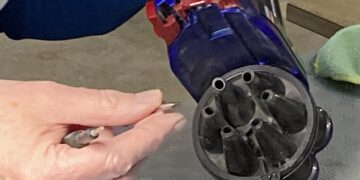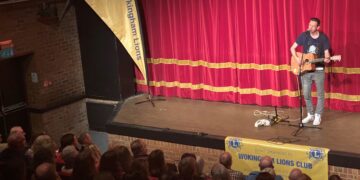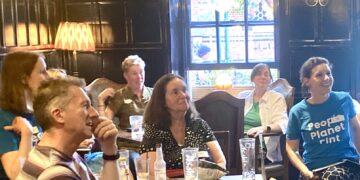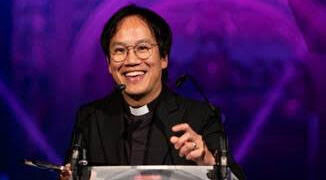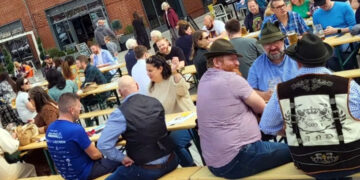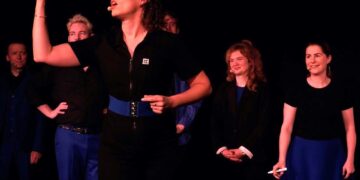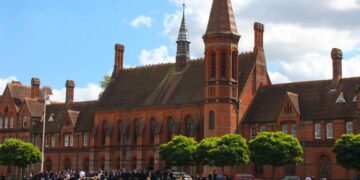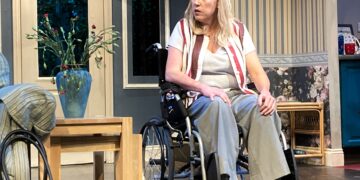IT’S AN evening with no holds Bard. And better jokes than that.
It’s both online and on stage. And you’ll never see a show like it again.
On Saturday, December 12, a group of famous names will be coming together to recite Shakespearean sonnets at Norden Farm in Maidenhead.
The charity evening started as an idea during the first lockdown.
Actors, directors and academics came together via Zoom for weekly performance sessions – it was a chance to perform, to share and to indulge in a love for the great Stratford-upon-Avon-based playwright.
Saturday’s performances – there are two – is the result. Sonnets In Action, With Actors will see a host of names including Steffan Rhodri (Gavin and Stacey, Harry Potter), David Neilson (Roy Cropper from Coronation Street), Miles Jupp (The Thick Of It, Rev, Greed) come together for a show that is billed as part-master class, part-rehearsal, part-sharing, part-spoken word gig, part-group therapy, and all audience participation.
The actors will share what they have learned about the sonnets during lockdown – and the only script is Shakespeare’s words. So, says director Philip Brean, anything could happen.
Like Susie Dent masters the words in Countdown, waiting in the wings will be Carol Chillington Rutter, Professor of Shakespeare and Performance Studies, University of Warwick.
She will have access to a complete works, a microphone and a bell, if things start getting out of hand she can tell a cast member that they’re Bard (sorry).
Expect a fun, unpretentious, accessible, cliché-busting, myth torpedoing introduction to playing Shakespeare. Come, listen, participate, heckle and leave everything you’ve learned about Shakespeare at the door.
Philip says: “The actors are really looking forward to playing for the people who come to see the show, and the theatre is looking forward to having people back in the building.
“Of course, it is with a sense of sadness. We conceived the show back in the summer and it felt like it would be part of a wave of opening of theatres around the country, maybe around the world.
“Since that time, things have got slightly more complicated and slightly more difficult.”
Philip cites Broadway being closed until the autumn of next year as an example of these difficulties.
“But,” he adds, “We’ve devised something that is possible to do in a Covid-safe way, which we’re delighted by, but there’s also a kind of melancholia with it too because, of course, many of us are no clearer as to when we might be able to go back to work.”
The idea for the show was actually a revival from Philip’s days with the Royal Shakespeare Company when the late Terry Hands ran sonnet sessions.
“Very sadly, Terry died in February this year, and (our Zoom sessions) began as a tribute to him.”
The sessions also, Philip feels, help actors hone their skills, learning how to read the sonnets and creating different techniques.
“The whole thing kind of grew from there, week by week, more and more people joined and we’d regularly have 20-odd people on a Monday and Thursday, just sort of turning up having learnt a sonnet and sharing it with the group.”
They were joined by some very famous names, and also had a lecture from James Shapiro, who worte a biography of Shakespeare.
“It became quite sort of free form,” he says of the sessions, “But it was always about the sonnets.
“Shakespeare wrote most the 154 sonnets during times of plague in his own lifetime.”
The experience of the Bard mirrors in some ways ours today, with theatres closed for 14 months, a decision that would have severely affected his company of players.
“Shakespeare was slightly more successful than us, having written all those sonnets,” Philip says modestly.
But there was something in these lunchtime sessions that attracted actors together.
“I didn’t expect it to snowball,” he says, but the actors came, and from different backgrounds. Comedian Miles Jupp mixing with soap actor David Nielsen – who plays Roy in Coronation Street – along with “lots of people that would be recognised from any of the big dramas from Netflix or the BBC in the last few years”.
What is so attractive about Shakespeare’s sonnets?
“He writes of open wounds and fractured psyches and all the things that make us human. It’s in those that the minute detail of the universal can be found,” Philip thinks, adding that the full gamut of human emotions are there.
“These are all things that Shakespeare deals wth in his sonnets. They, like all truly great works, survive because they’ve always got something to say. Tehre are always people who are grappling with complex and contradictory emotions, particularly now, when we’re surrounded by a lot of death and not a great deal of optimism.”
Saturday’s performances will be unique, both times over, and even Philip doesn’t quite know what to expect.
“I mean I’m just there as director, as a sort of interlocutor,” he says. “The simplest facts is that we can’t rehearse (in person). The interactions between the sonnets are going to be like the masterclasses we were doing.
“Tehre will be a bit in the second half where we work on a sonnet together, hopefully we can do that with the audience as well.
“We just see what’s there on the page and how we as actors try and see and feel how Shakespeare is directing us through what he has written.
“It’s an emotional exploration and also an exploration of technique.”
Philip really wants the session to be interactive, with the audience involved, but admits as that as the show has never been performed before, he doesn’t know how it will go.
He promises it won’t be like stand-up comedy where only masochists sit in the first few rows.
“We’d love it is people come along and feel like they’ve learned something,” he says. “If they thought they knew about Shakespeare, they might be challenged and might encourage people to resasse, re-read the sonnets which have given us a lot of pleasure.”
Isn’t Shakespeare elitist?
“Einstein has a quote about physics – ‘Everything should be made as simple as possible, but no simpler’ – which is sort of how I feel about Shakespeare,” Philip explains.
“I’ve never thought that you need to have a brain to understand Shakespeare, you only need a soul, and everyone’s got one of those.
“I was told you need to have lived and experienced life to really get to grips with Shakespeare. At school, I was told I wouldn’t be bright enough to take English literature at A-level.
“When I encountered Shakespeare at school, I thought it was kind of marvellous, but my teacher said to me, no. So I had a real hang-up about Shakespeare for many years.”
But Philip now appreciates the Bard for who he is, and hopes that on Saturday, people’s enthusiasm for his works will grow as well.
The show has a dual purpose: proceeds will be shared between Norden Farm’s Ark Appeal and Harry’s Fund, founded by Christian Patterson, one of the actors appearing at the event.
When five-year-old Harry died in a tragic accident outside the family home, his family found there was precious little help available to get them through their darkest hours.
So they set up a charity in Harry’s name to help people who have lost children in sudden or accidental death circumstances.
Philip says: “We want to help our friend Christian and his charity, and we thought it would be great to do something for Norden Farm as well.”
Sonnets, in Action, With Actors is performed at 5pm and 8pm on Saturday, December 12. Tickets are £20 per seat or, if watching from home, per household.For more details, or to book, log on to https://norden.farm/events/sonnets-in-action-with-actors





